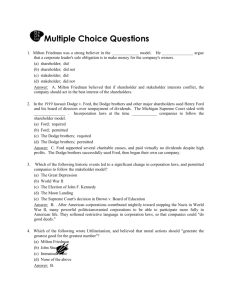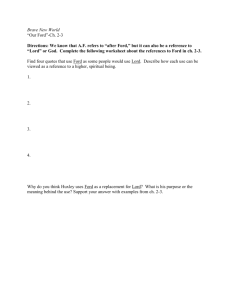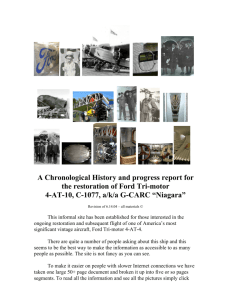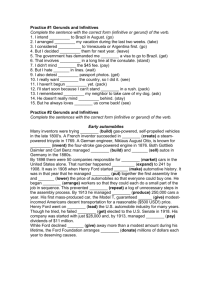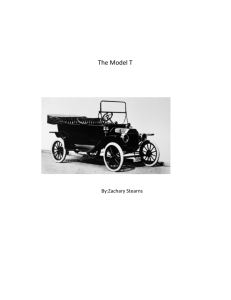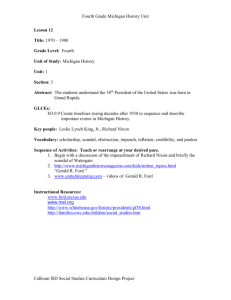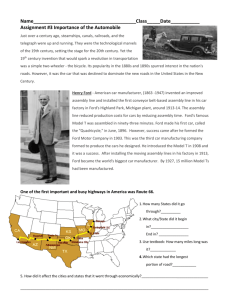See Attachment - MacDonald, Illig, Jones, & Britton LLP
advertisement
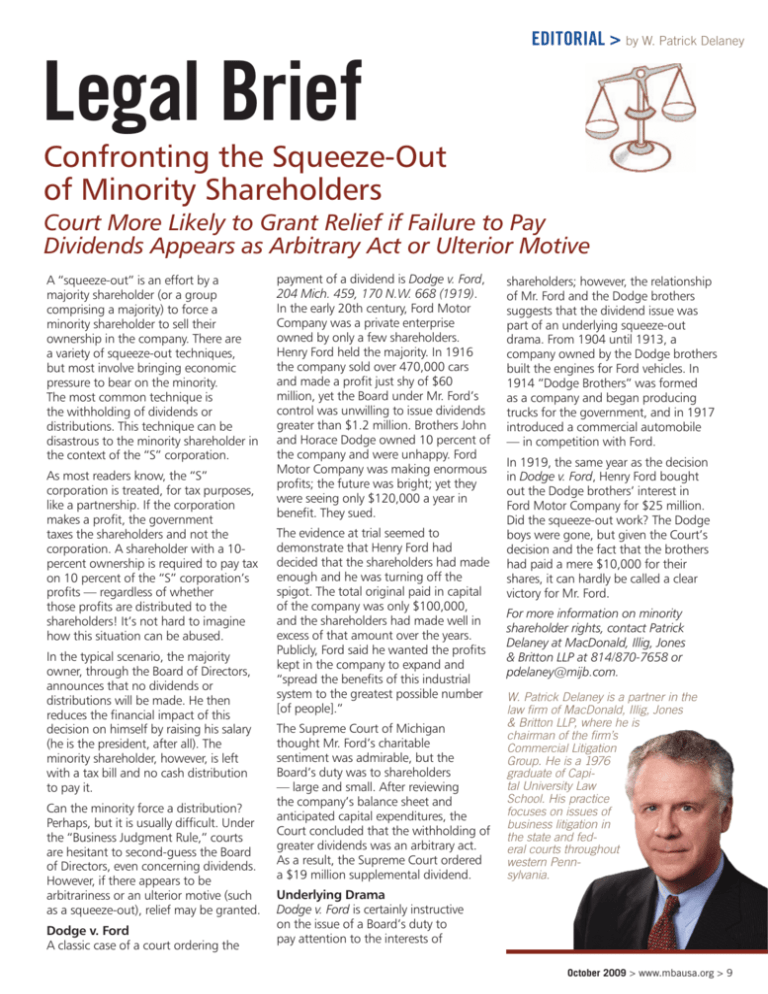
Legal Brief EDITORIAL > by W. Patrick Delaney Confronting the Squeeze-Out of Minority Shareholders Court More Likely to Grant Relief if Failure to Pay Dividends Appears as Arbitrary Act or Ulterior Motive A “squeeze-out” is an effort by a majority shareholder (or a group comprising a majority) to force a minority shareholder to sell their ownership in the company. There are a variety of squeeze-out techniques, but most involve bringing economic pressure to bear on the minority. The most common technique is the withholding of dividends or distributions. This technique can be disastrous to the minority shareholder in the context of the “S” corporation. As most readers know, the “S” corporation is treated, for tax purposes, like a partnership. If the corporation makes a profit, the government taxes the shareholders and not the corporation. A shareholder with a 10percent ownership is required to pay tax on 10 percent of the “S” corporation’s profits — regardless of whether those profits are distributed to the shareholders! It’s not hard to imagine how this situation can be abused. In the typical scenario, the majority owner, through the Board of Directors, announces that no dividends or distributions will be made. He then reduces the financial impact of this decision on himself by raising his salary (he is the president, after all). The minority shareholder, however, is left with a tax bill and no cash distribution to pay it. Can the minority force a distribution? Perhaps, but it is usually difficult. Under the “Business Judgment Rule,” courts are hesitant to second-guess the Board of Directors, even concerning dividends. However, if there appears to be arbitrariness or an ulterior motive (such as a squeeze-out), relief may be granted. Dodge v. Ford A classic case of a court ordering the payment of a dividend is Dodge v. Ford, 204 Mich. 459, 170 N.W. 668 (1919). In the early 20th century, Ford Motor Company was a private enterprise owned by only a few shareholders. Henry Ford held the majority. In 1916 the company sold over 470,000 cars and made a profit just shy of $60 million, yet the Board under Mr. Ford’s control was unwilling to issue dividends greater than $1.2 million. Brothers John and Horace Dodge owned 10 percent of the company and were unhappy. Ford Motor Company was making enormous profits; the future was bright; yet they were seeing only $120,000 a year in benefit. They sued. The evidence at trial seemed to demonstrate that Henry Ford had decided that the shareholders had made enough and he was turning off the spigot. The total original paid in capital of the company was only $100,000, and the shareholders had made well in excess of that amount over the years. Publicly, Ford said he wanted the profits kept in the company to expand and “spread the benefits of this industrial system to the greatest possible number [of people].” The Supreme Court of Michigan thought Mr. Ford’s charitable sentiment was admirable, but the Board’s duty was to shareholders — large and small. After reviewing the company’s balance sheet and anticipated capital expenditures, the Court concluded that the withholding of greater dividends was an arbitrary act. As a result, the Supreme Court ordered a $19 million supplemental dividend. shareholders; however, the relationship of Mr. Ford and the Dodge brothers suggests that the dividend issue was part of an underlying squeeze-out drama. From 1904 until 1913, a company owned by the Dodge brothers built the engines for Ford vehicles. In 1914 “Dodge Brothers” was formed as a company and began producing trucks for the government, and in 1917 introduced a commercial automobile — in competition with Ford. In 1919, the same year as the decision in Dodge v. Ford, Henry Ford bought out the Dodge brothers’ interest in Ford Motor Company for $25 million. Did the squeeze-out work? The Dodge boys were gone, but given the Court’s decision and the fact that the brothers had paid a mere $10,000 for their shares, it can hardly be called a clear victory for Mr. Ford. For more information on minority shareholder rights, contact Patrick Delaney at MacDonald, Illig, Jones & Britton LLP at 814/870-7658 or pdelaney@mijb.com. W. Patrick Delaney is a partner in the law firm of MacDonald, Illig, Jones & Britton LLP, where he is chairman of the firm’s Commercial Litigation Group. He is a 1976 graduate of Capital University Law School. His practice focuses on issues of business litigation in the state and federal courts throughout western Pennsylvania. Underlying Drama Dodge v. Ford is certainly instructive on the issue of a Board’s duty to pay attention to the interests of October 2009 > www.mbausa.org >
